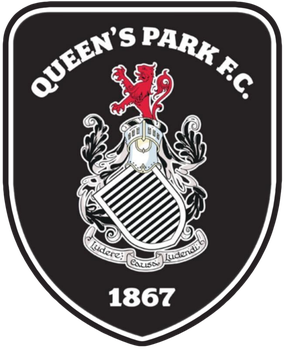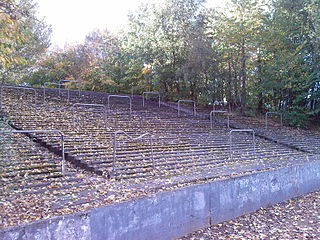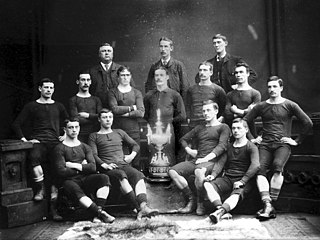Related Research Articles

Queen's Park Football Club is a Scottish professional football club based in Glasgow, which currently plays in the Scottish Championship, the second tier of the Scottish football pyramid. Queen's Park is the oldest association football club in Scotland, having been founded in 1867, and is the 10th oldest in the world.

Hampden Park, often referred to as Hampden, is a football stadium in the Mount Florida area of Glasgow, Scotland. The 51,866-capacity venue serves as the national stadium of football in Scotland. It is the normal home venue of the Scotland national football team and was the home of club side Queen's Park for over a century. Hampden regularly hosts the latter stages of the Scottish Cup and Scottish League Cup competitions and has also been used for music concerts and other sporting events, such as when it was reconfigured as an athletics stadium for the 2014 Commonwealth Games.

Third Lanark Athletic Club was a Scottish football club based in Glasgow. Founded in 1872 as an offshoot of the 3rd Lanarkshire Rifle Volunteers, the club was a founder member of the Scottish Football Association (SFA) in 1872 and the Scottish Football League (SFL) in 1890. Third Lanark played in the top division of the SFL for the majority of the club's existence, and won the league championship in 1903–04. The club also won the Scottish Cup twice, in 1889 and 1905. Third Lanark went out of business in 1967, as a result of mismanagement, six years after having finished in third place in the SFL. Third Lanark's former ground, Cathkin Park in Crosshill, is still partially standing and is used for minor league football.

Cathkin Park is a municipal park in Glasgow, Scotland. The park is maintained by the city's parks department, and it is a public place where football is still played. The park contains the site of the second Hampden Park, previously home to the football clubs Queen's Park and Third Lanark. The site of the original Hampden Park is just to the west.

Alan Lauder Morton was a Scottish footballer who played as a outside left for Queen's Park, Rangers and Scotland.
Clydesdale F.C. was a nineteenth-century Glasgow-based football club, which was attached to Clydesdale Cricket Club.
The 1884 FA Cup final was a football match between Blackburn Rovers and Queen's Park contested on 29 March 1884 at the Kennington Oval. It was the showpiece match of English football's primary cup competition, the Football Association Challenge Cup, it was the 13th Cup final. It was the first time that a Scottish team reached the final of the tournament, with Queen's Park knocking out the previous holders of the trophy en route.
Kenneth William Eadie is a Scottish retired footballer who played for, amongst others, Clydebank, Airdrieonians and Queen of the South during his career.
John Miller "Ian" McColl was a Scottish football player and manager. McColl played as a defender for Queen's Park and Rangers, while he also represented both the Scotland national team and the Scottish League. After retiring as a player, he managed the Scotland national team and English club Sunderland.
The 1898–99 season was the 25th season of competitive football played by Rangers F.C.

The 1873–74 Scottish Cup – officially the Scottish Football Association Challenge Cup – was the first season of Scotland's most prestigious football knockout competition. A total of 16 teams from the west of Scotland entered the competition, however only 14 would play a match after two withdrawals. The competition began with the first match between Renton and Kilmarnock on 18 October 1873 and concluded with the final on 21 March 1874. After 16 matches and 38 goals, the inaugural cup was won by Queen's Park who defeated fellow Glasgow club Clydesdale 2–0 in the final.

The 1874–75 Scottish Cup – officially the Scottish Football Association Challenge Cup – was the second season of Scotland's most prestigious football knockout competition. Teams from Edinburgh, Renfrewshire and Lanarkshire entered the competition for the first time and with 12 new teams entering the competition, a total of 25 were included in the first round draw. The competition began with the first round match between Rangers and Oxford on 10 October 1874 and concluded with the final on 10 April 1875. After 27 matches and 56 goals scored, defending champions Queen's Park retained the trophy by defeating Dunbartonshire club Renton 3–0 at the original Hampden Park.
The 1874 Scottish Cup final was the inaugural final of the Scottish Cup and the final of the 1873–74 Scottish Cup, the most prestigious knockout football competition in Scotland. The match took place at Hampden Park on 21 March 1874 and was contested by Queen's Park and Clydesdale.

The Glasgow Merchants' Charity Cup was a knockout football tournament open to teams from in and around Glasgow and later on in the tournament's history, teams from outwith Glasgow. Invitations were made and sent out by the Glasgow Charity Cup Committee (GCCC) at their discretion, but no criteria were ever published.
The 1881 Scottish Cup Final was the eighth final of the Scottish Cup and the final of the 1880–81 Scottish Cup, the most prestigious knockout football competition in Scotland. The original match was played at Kinning Park sports ground in the burgh of Kinning Park on 26 March 1881 and was watched by a crowd of 15,000 spectators. The final was contested by defending champions Queen's Park and Dumbarton.
Season 1998–99 was the 115th football season in which Dumbarton competed at a Scottish national level, entering the Scottish Football League for the 93rd time, the Scottish Cup for the 104th time and the Scottish League Cup for the 52nd time.
William McKenzie Hastie was a Scottish amateur footballer who made more than 280 appearances in the Scottish League for Queen's Park as a left half. He represented Scotland at amateur level and made one friendly appearance for Great Britain. After his retirement as a player, Hastie became a coach at Queen's Park.
The Original Glasgow derby is the name for the old rivalry between crosstown Scottish football clubs Queen's Park and Rangers, both based in Glasgow. The two clubs, alongside Celtic, are two of the most successful in the Scottish Cup, and the rivalry between them was one of the more intense in the early years of Scottish football, before being overtaken by the Old Firm rivalry from the 1900s onwards. The highest Scottish Cup attendance figure for the fixture was recorded on 18 January 1930 at Hampden Park for the first round, when 95,722 fans attended. The two clubs met in the top flight for last time during 1957–58, the final season before Queen's Park's relegation. The club retained their amateur status from their foundation in 1867 until 2019, which meant it was extremely difficult to compete at the highest level and the intensity of the derby dramatically declined after 1958 as the Spiders never returned to the top tier.
The 2022–23 Scottish Premiership was the tenth season of the Scottish Premiership, the highest division of Scottish football, and the 126th edition overall of the top national league competition, not including one cancelled due to World War II. The season began on 30 July 2022.
Battlefield Football Club, often referred to as The Battlefield, was a 19th-century football club based in Langside, in Glasgow. The club took its name from the site of the Battle of Langside in 1568.
References
- ↑ Litster, John. Record of Post-War Scottish League Players. Norwich: PM Publications.
- ↑ Glasgow Live | https://www.facebook.com/448120868723656/posts/pfbid02ogcYtqeFqSYGtFdzSCmCAhrnaAdsHLAbhPqEtvbht51kcQ1TxZVWSsCCWA7R7raql/?sfnsn=scwspmo
